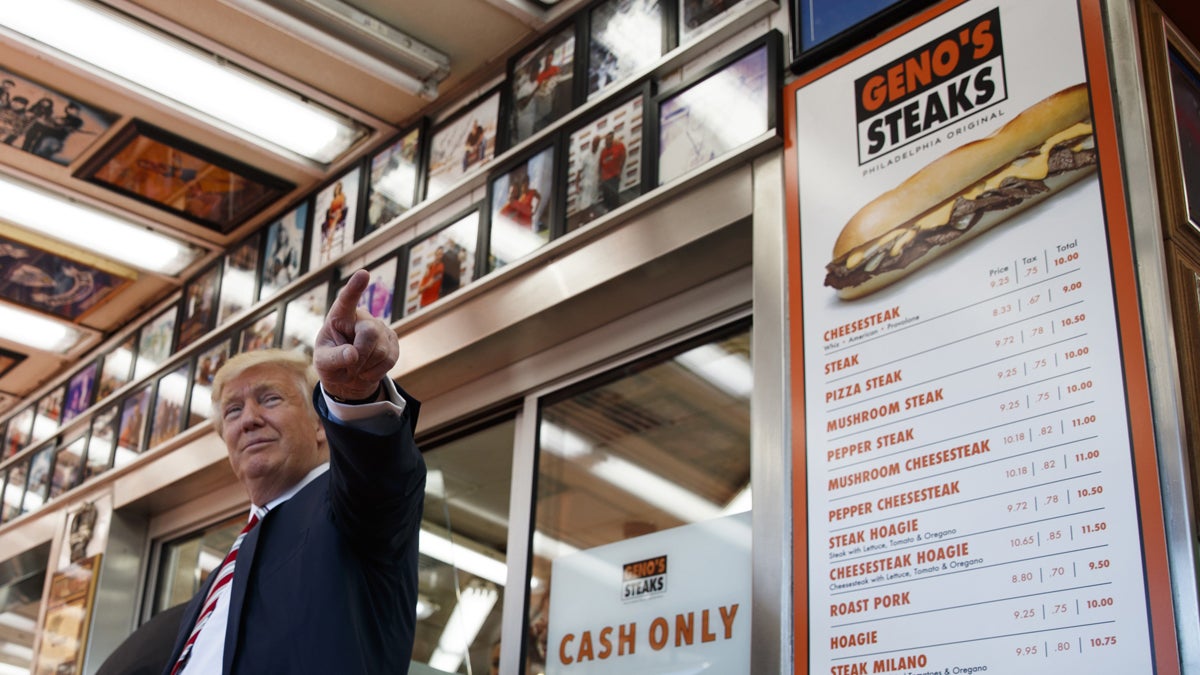Letter: Philly can save Donald Trump from himself — by not doing business with him

Republican presidential candidate Donald Trump talks with customers during a visit to Geno's Steaks
An open letter to leaders in Philadelphia government to consider prohibiting the city from doing business with companies owned by seated, elected officials, be they Republican, Democrat, state, local, or federal.
TO: Mayor Jim Kenney, City Council President Darrell ClarkeFROM: Bill Hangley Jr., freelance journalist and concerned citizenRE: Protecting the credibility and good name of the office of president of the United States
Gentlemen:
You may know me as a local freelance reporter specializing in public education.
But today I write to you not as a journalist but as a citizen and patriot committed to fair play in politics and business, and I do so with sense of urgency: Our president-elect’s reputation is in danger, and it is up to Philadelphia and cities like it to protect it.
Specifically, because of his extensive business interests in America and worldwide, our president-elect is extremely vulnerable to accusations of corruption and conflict of interest.
Anytime he or anyone connected to his business interests negotiates anything with anyone, Donald Trump will be open to attacks: Is he trying to help the public, or help himself?
Such allegations will be extremely damaging to the president-elect, to the office of the president, and to America’s standing in the world.
In fact, no less an authority than the Wall Street Journal has argued that the president-elect should immediately “liquidate” his interests in his many businesses. “The presidential stakes are too high for Mr. Trump to let his family business become a daily political target,” the paper opined.
Such concerns may seem abstract now, but all Philadelphians know how quickly allegations of impropriety can swamp even the most modest policy proposal.
For example: Imagine the public response if a Trump employee comes to Philadelphia and says, “We would like to build a hotel on such-and-such a city-owned parcel.”
Or, “We would like to help build public housing in North Philadelphia.”
Or, “We seek the necessary permits to open a chain of TrumpCare clinics being run under our newly privatized Medicaid system.”
Any move by the city to facilitate such requests — no matter how ethically managed — will trigger instant allegations of undue pressure from the White House.
Such concerns would come not only from the president-elect’s political opponents, but from his businesses’ competitors.
Imagine, for example, that you were a real-estate developer with an alternate proposal for that city-owned lot. You’d probably feel helpless to compete with a man who controls not only a global business empire but also the federal bureaucracy, both houses of Congress, and a nuclear arsenal.
And even if Trump’s employees deployed no undue pressure whatsoever, his competitors will still think: “I’m screwed. Trump knows the mayor and City Council need him to back funds for highways, health care, housing, education, transit, and countless other programs. He has all kinds of levers of influence, and I have none. I’ll never get a fair shake.”
The president-elect needs protection from such criticism. Philadelphia can help by passing a law prohibiting city officials from taking part in any activity involving a business owned in whole or in part by any elected official, up to and including the president of the United States, for as long as that official holds office.
Such a law would nip in the bud even the appearance of impropriety. Should a Trump employee suggest building a hotel on a city-owned parcel, city officials could simply say: “We’re sorry. Our hands are tied.”
Such a law would also head off any pressure from local interests who might believe — however incorrectly — that their agenda can be advanced by helping President Trump.
Surely, neither the mayor nor the Council president wants to be deluged with calls from interest groups saying, “Give him this or that, or we can forget about those bike paths or those housing units or that Delaware River dredging project.”
The president-elect might not welcome such a law. But he is new to public service. He may not recognize that his business interests will cast a shadow over his political agenda. Philadelphia can help show him the way: “Mr. President, we know you don’t like this, but trust us: It’s for your own good — and for the good of all future presidents.”
Should city officials someday endorse the president-elect for a second term, let no one say that it’s simply because he got a sweetheart land deal and built a large hotel using several thousand union workers.
Let it be said that it was because he helped our city grow and prosper by virtue of his dedicated public service.
Sincerely yours,
Bill Hangley, Jr.Freelance journalist and concerned citizen
WHYY is your source for fact-based, in-depth journalism and information. As a nonprofit organization, we rely on financial support from readers like you. Please give today.

